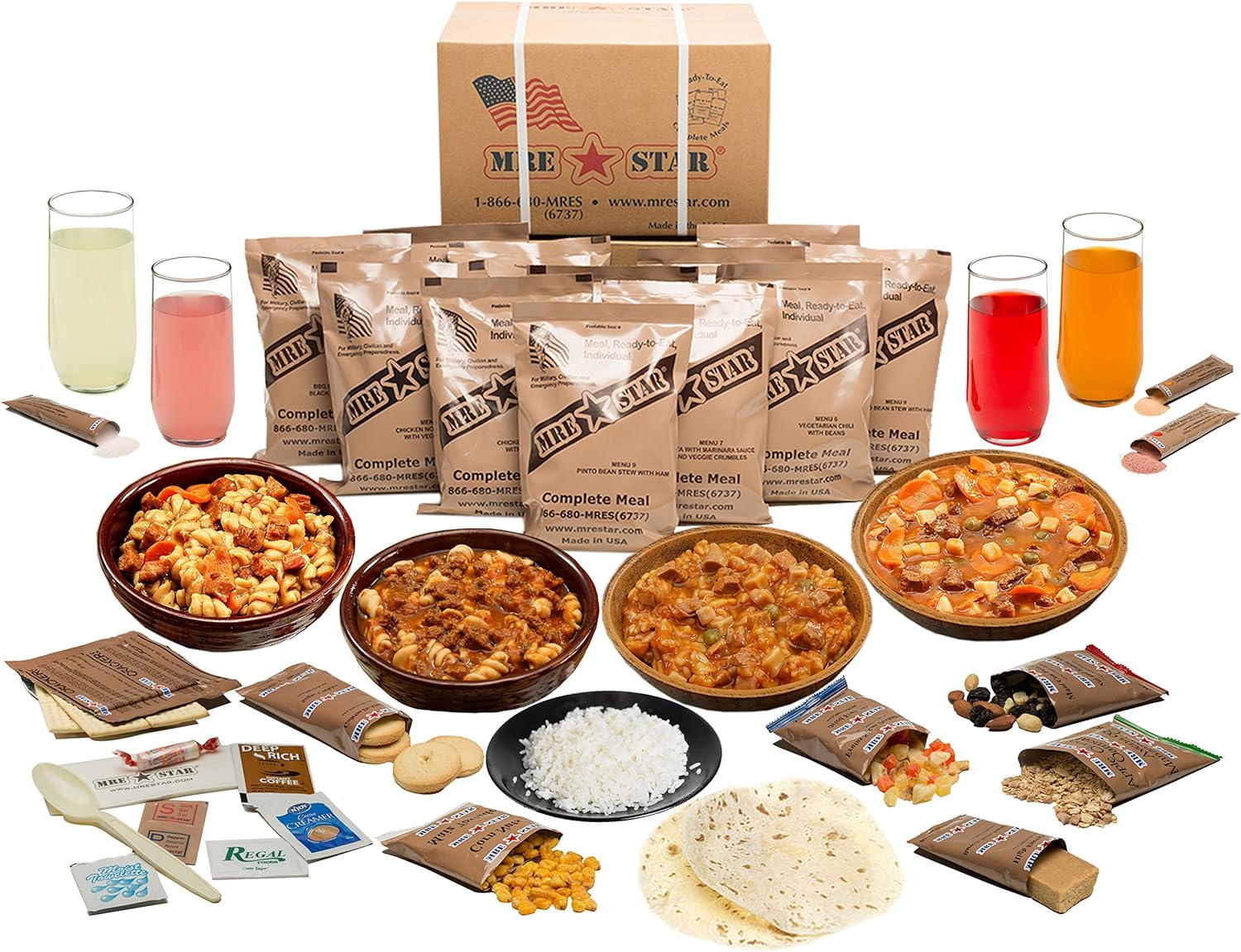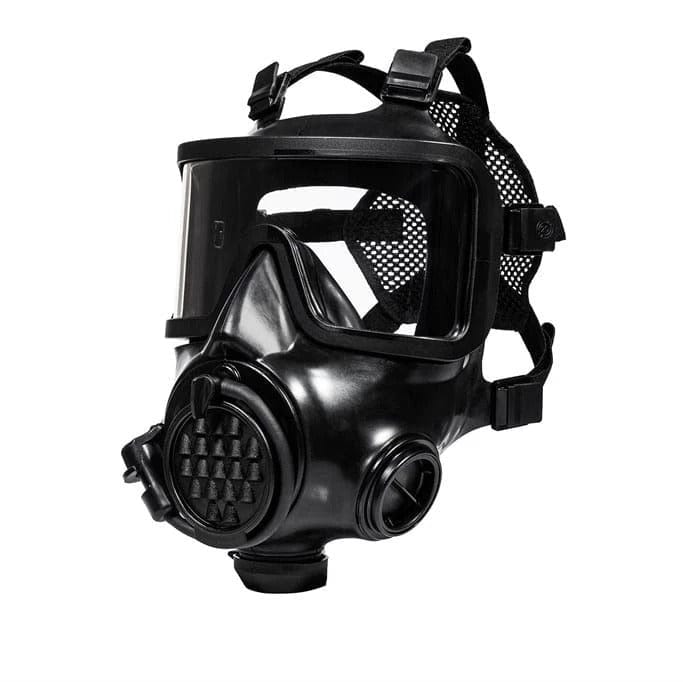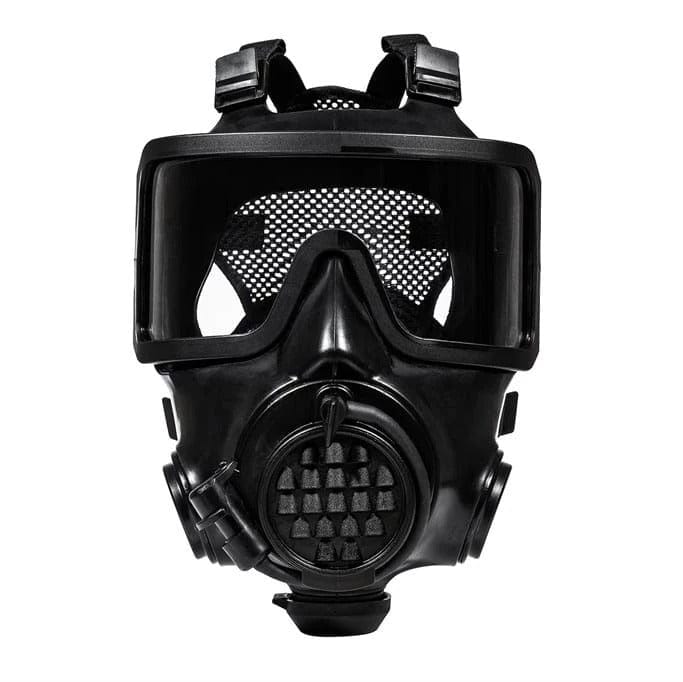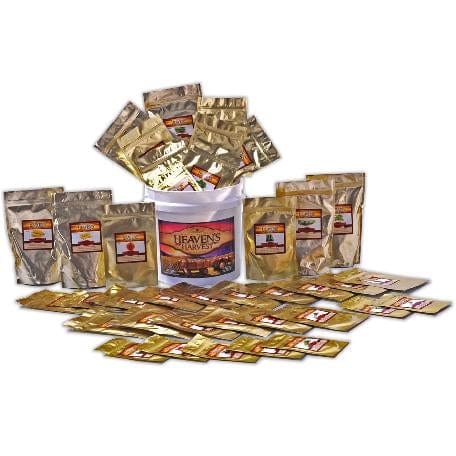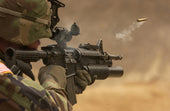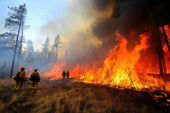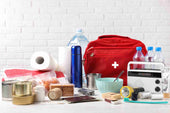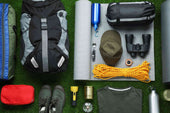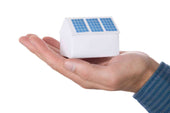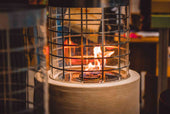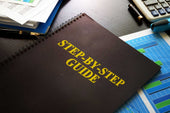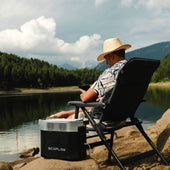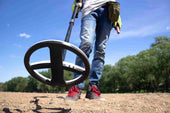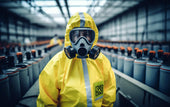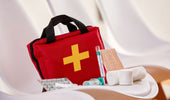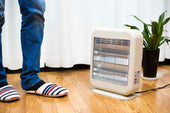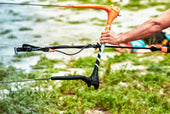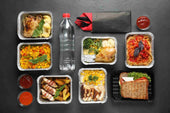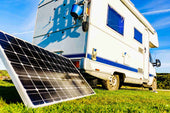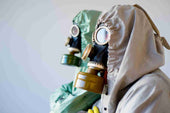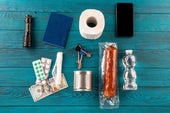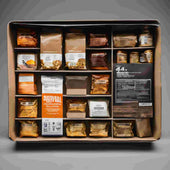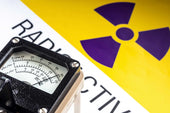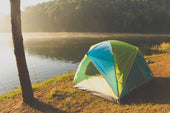Prepper List for Life-And-Death Survival Situation
 Prepping is a way of life, to say the least. Turbulence can strike in an instant and disrupt your everyday routine. When a life-and-death situation arises, everyone's first instinct is to panic and attempt to "prep up" at the last minute.
Prepping is a way of life, to say the least. Turbulence can strike in an instant and disrupt your everyday routine. When a life-and-death situation arises, everyone's first instinct is to panic and attempt to "prep up" at the last minute.
However, this is such a risky move because in times of calamity, supplies become scarce, and hindrances can come in between. So, prepping up before the fact will save you a lot of worries, energy, and time when it comes.
Who doesn't want to be "better" prepared for emergencies? However, most people are unsure where to start or whether they are doing it correctly.
If you're reading this, you're probably here to get a sense of the "prepping for beginners" emergency preparedness checklist—well, you are not wrong!
Perhaps you are stressing over an unexpected layoff, home intrusions, fender benders, days of electricity blackouts, natural disasters such as typhoons, earthquakes, or tsunamis, or the long-term economic and societal decline.
With all those mentioned, it is smart to start prepping up as early as now. The thing about prepping up is that you don't wait until you need it because if you do, it's already too late by then.
If you are a beginner, don't worry. You're not alone.
Millions of rational people from varying backgrounds are approaching preparedness seriously, and the movement is growing as more individuals acknowledge they can't rely on others to save them in our ever-changing world.
In any case, preparing can sometimes appear overwhelming and even intimidating. Furthermore, to exacerbate the situation, there's a ton of insane "loud minority" garbage out there that puts rational preparedness in a bad light by associating it with fanaticism, hazardous information, or senseless web discourse that doesn't make any difference.
For your convenience, refer to this short and beginner-friendly prepper list:
-
Build a solid foundation (i.e., money, health, supply).
-
Prepare your home for two (2) weeks of self-reliance.
-
Have the option to leave your home at the last minute.
-
Plan for emergencies that happen away from home.
-
Develop core emergency-related abilities and practice with your gear.
-
Offer and recruit while proceeding to learn and going past the prepping basics.
In this article, we will talk about...
Solid Steps Towards Prepper List for Emergency Situation
-
 Prepping a solid foundation.
Prepping a solid foundation.

As a beginner in prepping, the first thing you need to do is build a solid foundation. This means starting to stock up on a few everyday essentials.
It may include considerably "evergreen" products, such as water reserves, emergency food, first aid kits, hygiene products, and sanitation supplies. Ultimately, these are the first products every beginner prepper should start with.Food Prepping
Any beginning prepper should start by stocking healthy survival food. Emergency food is dehydrated or freeze-dried food with a long shelf life, an excellent part of the survival checklist. You shouldn't think about eating this food until you have no choice.
Emergency food can mean the difference between panic and peace of mind. Therefore, we recommend storing at least fourteen days (or two weeks) of emergency food.
More prepared preppers often store six (6) to twenty-four (24) months' worth of food. However, the more emergency food you stock, the longer it will last; thus, you will be more prepared.
To give you an idea, you can hoard and stock emergency food, such as survival kits, freeze-dried meats, and frozen fruits and vegetables.You should know how much food to prepare in advance, which will likely affect your survival rate. Additionally, you must consider the number of calories each person needs to stay healthy, depending on age, sex, activity level, and body type.
For example, young adults and kids typically need more calories as their bodies grow. This goes by the logic that you also require fewer calories as you age.Generally, men consume more calories than women. This is because men's average body type and size are larger than women's.
Likewise, your activity level influences the number of calories you should consume. Generally, the more active you are, the more calories you should consume.Water Prepper List
After stocking up on food, the next thing that you should stock up on. Stocking up on water is as important as stocking up on emergency food —in fact, in most cases, it is debatably even more crucial.
It is almost impossible to stay alive on the deck during disasters or emergencies without food or water.Moreover, in times of crisis, food and water supplies immediately become "out-of-stock," making it extremely important to have a reserve.
For instance, while beginning your water stock, you want to stock two kinds of water: (1) clean drinking water enough for at least a 2-week consumption or fourteen gallons of water and (2) collected rainwater to "purify" it in case your run out of drinking water or to use it in replacement of your running water.
For instance, collected rainwater is perfect for preparing food, washing dishes, watering the garden, washing clothes and garments, and doing other household chores.In times of infrastructure failure, running water is one of the first things to fail or stop. Hence, it is important to prepare water to have something to use in a disaster.
Prepping First Aid Kits
Next on the list is first aid supplies, another essential evergreen product for beginners. Medical clinics and hospitals frequently become overcrowded in emergencies, increasing patient wait times and casualties.
When this occurs, you should be able to care for wounds yourself while you wait for care. You should know how to treat cuts to prevent infection or split broken bones.As per the Red Cross, it is suggested to have the following rundown of first aid supplies:
-
Bandages
-
Antiseptic wipes
-
Adhesive tape
-
Adhesive bandages
-
Antibiotic ointment
-
Gauze pads
-
Leg splint
-
Arm splint
-
Latex gloves
-
Emergency blanket
-
First aid guide
Of course, collecting these tools is one thing, but using them to perform emergency treatment is a different story. Learning and acquiring the ability to perform first aid will greatly help you in the future.
This is also why signing up for and attending basic first aid and CPR training with the Red Cross is important.Prepping Hygiene and Sanitation for Beginners
Another thing to stock up on is hygiene and sanitation products. These are any products you can use to maintain your hygiene or keep your home clean.
Depending on the crisis, these products can easily become "in-demand" or hard to find or access in emergencies. Consequently, we suggest keeping a reserve of all the cleanliness items you use in your bathroom (e.g., soap, hair products or shampoo, feminine hygiene products, dental care, toothpaste, toiletries, hand sanitizer, and alcohol).Stocking up on these personal hygiene essentials will help you maintain your health during a crisis. Keeping a cleaning supply is also essential for decreasing the spread of infection (or any type of disease).
The dirtier your house is, the higher the opportunity for illness to spread. Contracting an illness during a crisis is very hard because hospitals are oftentimes overcrowded at this time, leaving little to no room to accommodate just anyone in the emergency room. -
-
Prepare for two (2) weeks of self-reliance.

If an emergency occurs, it might take weeks, even months, to return to normal daily life. Therefore, we prescribe setting yourself up to be independent and self-reliant for at least fourteen (14) days or two weeks, perhaps even longer.
For instance, if your food reserves will not last for several weeks, you should plan early to obtain more food. Hunting, fishing, catching, and rummaging for food are fundamental skills for staying self-reliant during a disaster.In like manner, for water, it's crucial to have the arrangement to keep gathering and treating water if the water you prepared early runs out. We suggest having somewhere around two distinct methodologies for gathering and treating water.
Essentially, the goal is for you and your family to survive in your home for at least two (2) weeks with practically no external assistance. You can't expect electricity, water, cooking or heating gas, good communication lines and signals, internet connection, 911, ambulances, etc.
As per the Valley Food Storage, kindly refer to the home checklist summary below:
Water: store 15 gallons of potable water per person (roughly 1 gallon per day) and have ways to treat dirty water via either a portable water filter or the countertop water filter
Food: at least 23,000 calories per person (roughly 1,500 calories per day) of shelf-stable food that's ready to eat or only needs boiling water to make; usually one or a mix of extra supermarket food you normally eat anyway or special prepper food that lasts forever
Fire: lighters, matches, and backup fire starters
Light: headlamps, flashlights, candles, lanterns
Heating and cooling: indoor-safe heaters, extra blankets, USB-powered fan
Shelter: a tarp (even a cheap one you find at a local store) comes in handy for improvised shelter, plugging holes in the house, and clearing debris
Medical: list of 145 prioritized home medical supplies
Hygiene: wet wipes, hand sanitizer, camp soap
Communication: either a one-way NOAA radio or a two-way ham radio (if you know how to use it)
Power: spare batteries and rechargers (your bug-out bag will have a solar charger, but you can also get a second one for home)
Tools: an axe, a shovel, work gloves, a wrench for your gas lines, zip ties, and duct tape.
Self-defense: depends on personal views and may include body armor, firearms, pepper spray, etc.
Cash: as much as you can reasonably afford to stash
Mental health: board games, favorite books, headphones, movies downloaded to a tablet, etc.
Documents: copy of deeds/titles, insurance policies, birth certificates, maps, pictures of family members, etc., in both physical and USB thumb drive forms
Local and emergency information: Write down important contact numbers, know the location of the nearest hospitals, etc.
-
Get ready to evacuate anytime.

In specific situations, the wisest choice is to evacuate or seek shelter in an emergency location. For example, if a typhoon is approaching your home in a flood-prone area, you may choose to evacuate.
Of course, the best option is to evacuate to higher ground and wait out the storm in a safer area. Therefore, you must be fully prepared to move out at any time.
In doing so, you may want to prepare a bug-out bag so you have something to get quickly.Needless to say, an emergency can strike anytime. You may just have seconds to leave your home. Or, on the other hand, perhaps you gain a benefit (e.g., beating traffic) by evacuating while every other person is as yet scrambling.
That is why having one bag that is constantly stuffed and ready to use, regardless of the situation, will give you the edge to get by, easily handle the outcome, and possibly help others around you.Generally, a bug-out bag is a backpack filled with various survival necessities that help you stay fed, hydrated, and comfortable during evacuation.
Moreover, you may also consider doing the following:
-
Everybody in the family should have their bug-out bag and know precisely where it's found.
-
The bug-out bag should contain fresh drinking water, ready-to-go food, and other survival gear.
-
The gear you pack into your bug-out sack should be lightweight and travel-sized.
-
Your bug-out bags should be stored in a cool, dry area. For instance, you can wrap them in a garbage sack and keep them in a plastic sack in the carport.
-
-
Prep for Emergencies that Happen Away From Home

Emergencies are often very hard to predict, hence the name. So, all things considered, no one can tell when everything might go south. That's why it's crucial to be prepared for anything about to come, regardless of location.
You should also prepare to endure emergencies outside your home premises. Perhaps you can put some prepped emergency supplies in your car whenever possible.
Or if you're someone who commutes, prepping a bug-out bag in your high-water vehicle is also a good idea. -
Learn Emergency Skills and Take Up Self Defense Classes
To say the least, preparing survival gear and survival kit, stocking more in your food storage, hoarding medical supplies, or prepping up your water filtration system is not enough.
You need the skills and abilities to use these emergency kits properly and withstand a disaster.Perhaps you can learn core skills such as hunting, fishing, trapping, foraging, fire building, and even orienteering. You may also take time to build shelter and treat water.
Likewise, you need to practice with all your gear, such as practicing in camping gear, growing your food or edible plants, cooking and preserving your freeze-dried food, and operating a solar oven, if there's any.
Survival Skills > Survival Gear List
 Proper survival skills are more important than completing your survival gear list. Still, adequate survival equipment will give you a big advantage in surviving a disaster.
Proper survival skills are more important than completing your survival gear list. Still, adequate survival equipment will give you a big advantage in surviving a disaster.
Emergency preparedness, in general, is a tool for increasing survival rates. It can help you withstand the strongest and most abrupt calamities you could never have foreseen.


